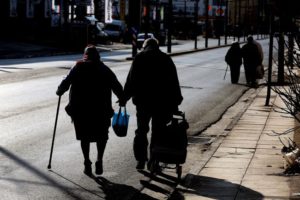
New research predicts the European population to fall more sharply than previously expected; from 450 million today to 310 million by the end of the century. The reason is a further decline in the fertility rate – the average number of children per woman.

Many variables have an effect of the fertility rate such as marriage age, access to birth control, the right to abortion and education to women. If the rate falls below approximately 2.1, the size of the population starts to fall, as is the case in Portugal, that has a fertility rate of 1.4.
However, with the new estimates of the study, Portugal will see their population further reduce by more than half by 2100.

In 2019 Portugal had a population of 10,3 million, about 280 thousand people less than a decade ago. The 2,7% decrease observed was mainly driven by a decrease in births but the migratory balance ended up attenuating this trend, given the fact that in the last ten years over 400 thousand immigrants entered the country as ‘new citizens’.

Aside from fewer people, the country registers a progressively older population, verifiable by the fact that only the group of people over 65 years of age increased between 2009 and 2019. In fact, Portugal is – after Italy and Greece – the third most aged EU country with the lowest percentage of young people. More than 20% of the Portuguese is over 65 and only 14% less than 15 years of age. There are now 163 elderly people for every 100 young ones.

About 52% of the population over 15 years has no more than basic education; the lowest percentage in Europe! In contrast, the percentage of people with secondary or higher education increased in the last decade to 33%. Though in 2019 still, 6% of the population over 15 years of age has no schooling whatsoever.
A WHO study of youngsters done before the corona epidemic revealed that Portuguese teenagers are more home-keeping than European and like less school. Only 9,5% of them say they like to go there. If performed now the survey might show surprising results as the pandemic seems to have improved the relationship between adolescents and schools, according to Tânia Gaspar, a psychologist and one of the researchers of the study. ‘Youngsters are more responsible now and closer to their teachers, who had to reinvent work methods – such as technologies – that were already familiar to their students.’
Stay healthy Fique saudavel (pic público/sapo)


 ‘Er zijn bejaarden in Portugal, die absoluut pervers behandeld worden’, zegt José de Faria Costa, ombudsman bij de gratis telefonische hulplijn voor ouderen ( Linha do Idoso). ‘Sommige kinderen gaan zo ver, dat ze – tegen de tijd dat het zomer wordt – stoppen met het geven van medicijnen aan hun ouders, waardoor die met spoed moeten worden opgenomen. Dan kunnen de kinderen rustig op vakantie’.
‘Er zijn bejaarden in Portugal, die absoluut pervers behandeld worden’, zegt José de Faria Costa, ombudsman bij de gratis telefonische hulplijn voor ouderen ( Linha do Idoso). ‘Sommige kinderen gaan zo ver, dat ze – tegen de tijd dat het zomer wordt – stoppen met het geven van medicijnen aan hun ouders, waardoor die met spoed moeten worden opgenomen. Dan kunnen de kinderen rustig op vakantie’.